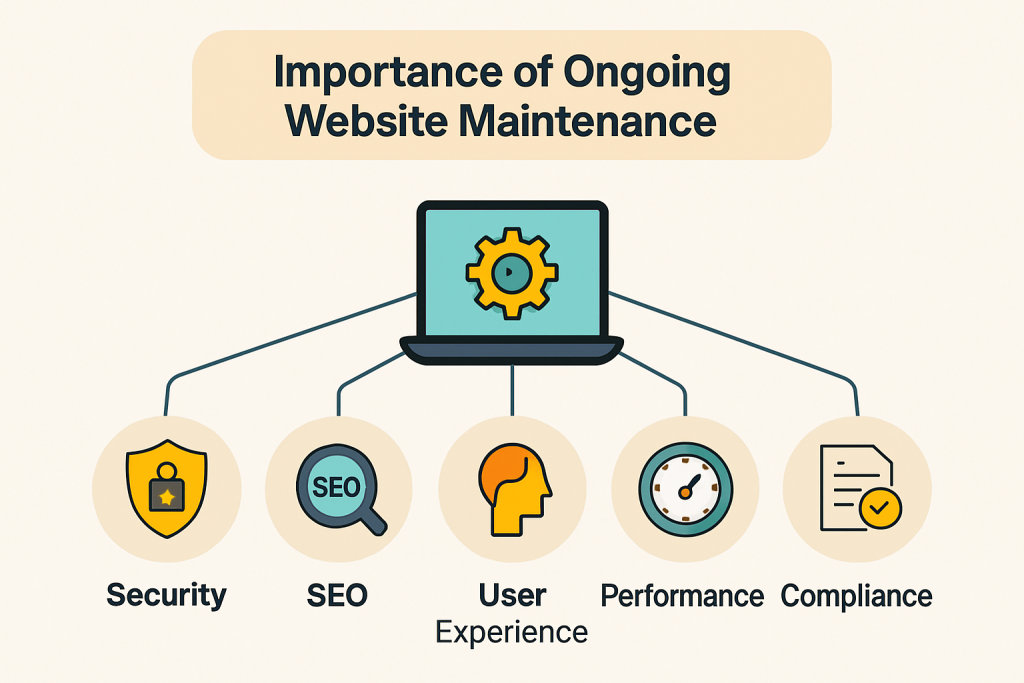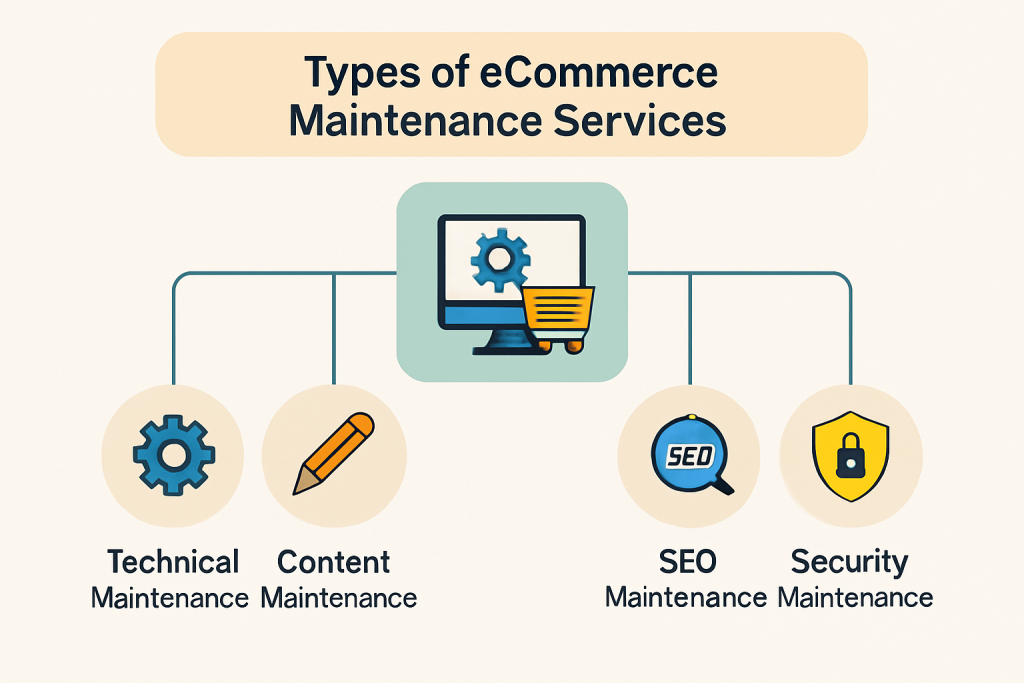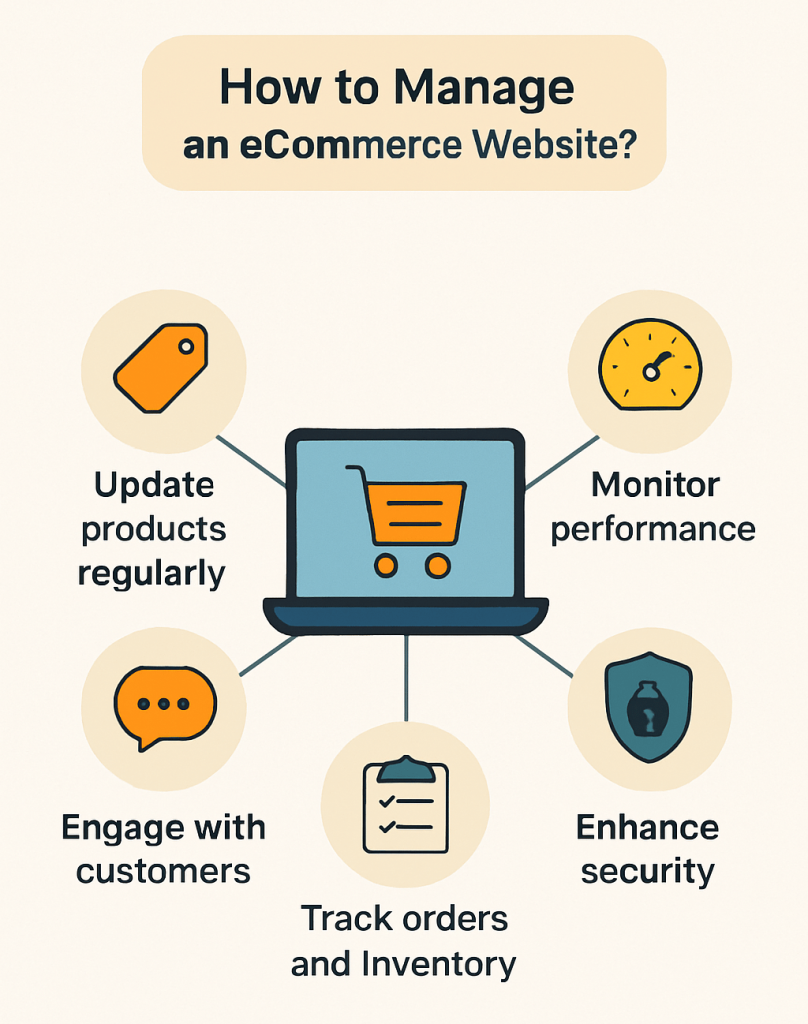Running a successful eCommerce store goes far beyond just launching a website. As online shopping continues to grow in 2025, having reliable eCommerce services and strong eCommerce website management services is more critical than ever. With more businesses shifting online, competition has become fierce. Consumers now expect fast-loading, easy-to-navigate, and secure websites that offer seamless shopping experiences. In this guide, we’ll break down everything you need to know about maintaining and managing your online store, from the basics to advanced tips that will keep your website performing at its best.
What Are eCommerce Services?
eCommerce services refer to a broad range of tools and support systems that help launch, operate, and grow your online store. These services can be as basic as setting up a product catalog and payment gateway, or as advanced as implementing AI-driven marketing automation and analytics. At the core, eCommerce services typically include:
- Website design and development to build a professional and user-friendly store
- Shopping cart setup and configuration to enable smooth purchases
- Integration with secure payment gateways like Stripe, PayPal, or Razorpay
- SEO tools and marketing strategies to attract organic traffic
- Inventory and order management systems to streamline operations
- Customer support integrations, such as live chat or helpdesk platforms
Also Read: https://softpulseinfotech.com/blogs/clothing-brand-name-ideas-and-design-websites/
Choosing the correct services tailored to your business needs can significantly improve customer satisfaction, sales performance, and brand loyalty. These services create the infrastructure that supports day-to-day business operations.
What is eCommerce Website Management?
eCommerce website management oversees all the operations that keep your online store running efficiently and effectively. This includes both front-end and back-end processes. While the front end focuses on what users see (like product pages and banners), the back end handles functions like site speed, plugin updates, and data backups.
An eCommerce manager or service provider typically ensures that the website is updated with the latest products, maintains mobile responsiveness, checks site analytics regularly, and manages security protocols. It also includes troubleshooting any technical issues, optimizing for SEO, and keeping an eye on competitors. Ultimately, eCommerce website management services allow business owners to focus on core activities like product development, customer service, and marketing while ensuring that the website remains operational 24/7.
What Does a Website Manager Do for Maintenance?
If you’ve ever asked yourself, What does a website manager do for maintenance, you’re not alone. Website maintenance covers various tasks to ensure the site continues functioning well and remains current with the latest standards. A website manager typically:
- Fixes technical bugs that may cause the site to crash or behave unexpectedly
- Updates themes, plugins, and software to their latest versions
- Adds new features and removes outdated ones
- Ensures mobile responsiveness and cross-browser compatibility
- Improves loading speed by optimizing images and scripts
- Enhances security through SSL installation, firewalls, and malware scans
- Updates policies like terms of service and privacy regulations
These updates aren’t just about appearance, they protect your website from downtime, keep customer data safe, and improve performance to meet modern browsing expectations.
Importance of Ongoing Website Maintenance
Ongoing website maintenance refers to the routine work to ensure your site stays in top condition. In today’s fast-moving digital world, websites can become outdated quickly. Here’s why website maintenance is essential:

- Security: Regular updates prevent your site from being vulnerable to hackers and malware.
- SEO: Google and other search engines prioritize active and error-free websites.
- User Experience: An up-to-date site ensures faster load times, better navigation, and reduced bounce rates.
- Performance: Ongoing checks help catch technical issues early before they affect sales or reputation.
- Compliance: Compliance with digital regulations (GDPR, ADA, etc.) is necessary in today’s business environment.
A well-maintained website reflects professionalism and helps build trust with your audience.
Benefits of Website Maintenance
The benefits of website maintenance go far beyond just keeping your site up and running. Let’s take a closer look at how it can positively impact your business:
- Enhanced Security: Hackers often target outdated plugins and themes. Regular updates minimize this risk.
- Improved SEO Performance: Search engines reward consistently updated and error-free websites.
- Better Customer Experience: Visitors are more likely to convert if your site is fast, functional, and user-friendly.
- Long-Term Cost Savings: Fixing problems early prevents bigger, costlier issues.
- Brand Credibility: A well-maintained site reflects a professional and trustworthy company.
In the short term, ignoring maintenance may save money, but it can lead to expensive problems, customer loss, and even data breaches in the long run.
Types of eCommerce Maintenance Services
There are multiple layers of eCommerce maintenance services, each designed to ensure your online store remains robust and adaptable:

- Technical Maintenance: Involves updating software, fixing bugs, and improving speed. This ensures your website is compatible with the latest technologies and devices.
- Content Maintenance: Includes editing product descriptions, uploading new images, managing blog content, and more. Keeping content fresh encourages repeat visits.
- SEO Maintenance: Helps maintain and improve your search engine rankings through regular keyword analysis, link checks, and meta updates.
- Security Maintenance: Regular backups, malware scans, and firewall setups are essential to protect business and customer data.
Professional eCommerce website maintenance services combine these tasks into a comprehensive plan tailored to your needs.
Why You Need Ongoing Website Management
Ongoing website management is an investment in your online store’s future. In the ever-changing digital landscape, a one-time setup is not enough. Here’s why ongoing management is essential:
- eCommerce platforms such as Shopify, WooCommerce, and Magento regularly update their systems for security and performance.
- Consumer behavior changes quickly, and adapting your website helps meet evolving expectations.
- Seasonal promotions, product launches, and marketing campaigns require frequent site updates.
- Technical issues, if left unattended, can damage your site’s reputation and lead to revenue loss.
Professional eCommerce website management teams ensure your store remains agile, secure, and customer-focused.
How Much Does It Cost to Maintain an eCommerce Website?
One of the most common questions is: How much does it cost to maintain an eCommerce website? The answer depends on the platform, store size, and the required services range.
- Small businesses pay around $100 to $500 monthly for basic updates and support.
- Medium-sized stores may need $500 to $2,000 monthly for additional services like SEO, performance optimization, and security.
- Large enterprises often invest $2,000 to $5,000+ monthly for full-service website management, including strategy and analytics.
Viewing this as an ongoing investment rather than an expense is essential. Regular maintenance protects your store, enhances user experience, and ensures regular updates with an ecommerce growth strategy.
How to Manage an eCommerce Website?
How can I manage an eCommerce website effectively? Here are practical tips to stay ahead:

- Update products regularly: Keep your inventory, pricing, and descriptions accurate.
- Monitor performance: Use tools like Google Analytics and PageSpeed Insights to identify areas for improvement.
- Schedule backups: Ensure your data is protected in case of unexpected issues.
- Enhance security: Use SSL certificates, firewalls, and anti-malware software.
- Engage with customers: Reply to reviews, handle support tickets, and collect feedback.
- Track orders and inventory: Use tools to automate and monitor fulfillment.
Hiring experienced eCommerce website management services ensures that none of these critical tasks are overlooked.
What Does an eCommerce Manager Do?
An eCommerce manager plays a key role in maintaining and growing your online store. Their responsibilities typically include:
- Monitoring website performance and solving any technical issues
- Managing product listings, pricing, categories, and stock levels
- Coordinating digital marketing campaigns like email marketing and paid ads
- Analyzing website traffic and customer behavior to improve conversions
- Planning seasonal promotions and sales events
- Working with developers and designers to implement new features or redesigns
They aim to keep your store running smoothly while continuously improving sales and user engagement.
Also Read: https://softpulseinfotech.com/blogs/ghost-commerce/
Which Platform Is Best for an eCommerce Website?
When starting or upgrading your online store, you may wonder: Which platform is best for an eCommerce website? Here are some top options:
- Shopify: Known for its ease of use, scalability, and integrated tools. Great for beginners and advanced sellers alike.
- WooCommerce: Ideal for those who already use WordPress. Offers high customization with thousands of plugins.
- Magento (Adobe Commerce): Best suited for large businesses with complex requirements. Offers powerful features but requires technical knowledge.
- BigCommerce: Provides excellent built-in tools for SEO, analytics, and marketing. Suitable for medium to large-scale operations.
Your choice depends on your business goals, budget, and technical expertise. Each platform provides access to various Shopify eCommerce development services and can be managed effectively with the proper support.
Final Thoughts
Whether you’re launching your first online store or scaling an established eCommerce business, the importance of eCommerce website management services and regular eCommerce website maintenance cannot be overstated. In 2025, customers expect fast, seamless, and secure shopping experiences. A slow or outdated website doesn’t just frustrate users, it directly affects your sales, SEO performance, and brand reputation.
Maintaining a high-performing online store requires more than fixing bugs or updating product pages. It’s about taking a proactive approach through ongoing website maintenance, including performance optimization, security updates, content management, and technical improvements. This ensures your store remains competitive, functional, and user-friendly, all year round.
Remember, a well-managed website isn’t a luxury, it’s a necessity in today’s digital economy. Investing in eCommerce website management means investing in your brand’s reliability, trust, and long-term success. Don’t wait until something breaks, choose a proactive, strategic approach that keeps your business running smoothly and your customers returning.



